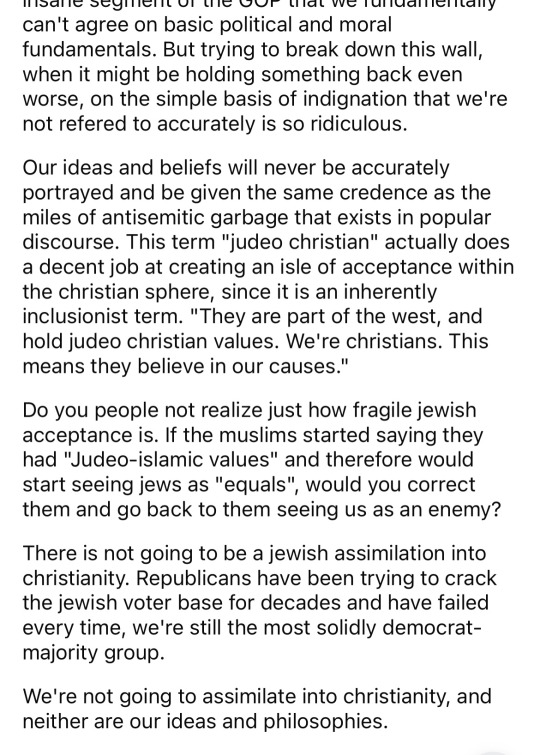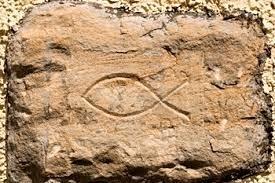#judeo christian
Text
I’m yet to meet a convert to judaism who’s not transgender. There’s something so trans in the conversion soup. Does judaism not allow cis converts? Did I not know that?
#trans#transgender#lgbt#ftm#mtf#nonbinary#t4t#transsexual#lgbt jews#jew#jewish#orthodox judaism#judeo christian#reform judaism#judaica#jumblr#convert#jewish conversion#jewish convert#jewish history#jewish culture#bestposts
541 notes
·
View notes
Text
Just a big reminder that "Judeo-Christian" isn’t a real thing. Judaism and Christianity are two separate religions, and grouping them together when discussing Christianity erases the uniqueness of Judaism and the marginalization of Jews.
826 notes
·
View notes
Note
hey, just wanted to ask what happened to your blog post titled "There is No "Judeo-Christianity", as it seems to only link to a 404 error when I try to click it on Tumblr or through a search engine
We recently updated our website and unfortunately, a major downfall has been our links expiring.
The article is still up and you can read it here!
136 notes
·
View notes
Text
"As the world’s first rain begins to fall, the scene ends with Aziraphale extending his wing over the darkly-cloaked Crowley who moves just a step closer to his white-robed companion. Kindness in the face of an absurd world. Friendship extended in tentative hope, light as a feather in an angel’s wing."
A meta for the ages, by an Assistant Professor of Preaching and Worship Leah D. Schade. It's really, really good, go read it now or you won't get any cookies! 🚫🍪
#good omens#good omens meta#religious analysis#judeo christian#crowley x aziraphale#ineffable husbands#aziracrow#consenting bicycle repairmen#air conditioning#aziraphale#crowley
33 notes
·
View notes
Text
Judeo Christian is a bullshit phrase for goyim and bootlickers and that’s why I like to pair my Magen David pendant with a pentagram choker to ward of Christians
#jumblr#judeo christian#Judaism#i literally could not care less what the devil thinks of my outfit but if it scares evangelicals away from talking to me it’s working
211 notes
·
View notes
Text

Uriel, Archangel of Wisdom and Knowledge
#uriel#archangel uriel#archangels#judeo christian#judeo christian mythology#angel of wisdom#angelcore
10 notes
·
View notes
Text
Judéo-christianisme–Nouvelle attaque «massive et coordonnée» contre les prêtres du Patriarcat arménien de Jérusalem
«Plus de 30 provocateurs armés ont forcé l'entrée du Jardin des Vaches et ont commencé leur attaque vicieuse», dénonce le Patriarcat dans un communiqué.
«La menace existentielle qui pèse sur le Patriarcat arménien est désormais une réalité physique».
Les évêques et les prêtres luttent pour leur vie même
L'entité sionistes, qui a reçu carte blanche des Occidentaux pour prendre le contrôle de Gaza et de ses ressources, profite de l'occasion pour pousser ses positions dans la ville Sainte...
...en s'appuyant sur les hommes d'affaires Danny Rubenstein et George Warwar, qui tentent d'expulser la communauté arménienne du Jardin des Vaches en faisant valoir un controversé contrat.
Après les Palestiniens, «les racistes et les suprémacistes du sionisme s'occuperont des chrétiens», avait prévenu Maduro.
#israeli colonialism#israeli crimes#israeli war crimes#israeli terrorism#israeli apartheid#israel is a terrorist state#israel is an apartheid state#israel apartheid#israel occupation#sionisme#sionistes#Judéo-christianisme#judeo christian#israel#israël#jerusalem#jérusalem#christianisme#christianophobie
6 notes
·
View notes
Text
If Playstation studios had any balls they would allow Santa Monica to make the next God of War Saga involve the Judeo-Christian mythology. I wanna see Kratos vs Jesus Christ. Where's my Adam and Eve double boss fight, where's the Sandalphon titan fight that's basically a bigger Cronos fight? This shit writes itself, exploring the garden of eden bro
#tunapost#god of war#gow#playstation#playstation studios#santa monica#santa monica studio#judeo christian#mythology#kratos
30 notes
·
View notes
Text



I'm not going to do a whole breakdown on this right now, but I might some other time. The whole gist of this painfully long message is that this person, who claims to be Jewish, thinks that Jews should do whatever we can to ingratiate ourselves to Christians so that they don't kill us. Because historically that's worked out really well. Their entire mindset is "shut up and take what you're given".
"Judeo-Christian" just means "Christian". It uses Jews as a shield to enact bigotry under the guise of interfaith solidarity. There are absolutely bigoted Jews, but the people using this term are very much pushing a very specific flavor of Christian values.
21 notes
·
View notes
Text
It is soooo annoying when goyim say judeo Christian when they mean Christian and know nothing about judaism but they wanna sound smart. “Judeo Christian concept of hell” “judeo Christian concept of original sin” lol. (These r just Christian things)
Shoutout to my a level classics teacher who this post is about
#orthodox judaism#reform judaism#jewish#judaism#jew#jewish history#jewish culture#judeo christian#stuff i said#bestposts
417 notes
·
View notes
Text
666 days around the world
Chapter 1: Paradise visited

Satan didn’t know what to expect when he arrived on Earth. It’s been so long since he last visited. He was almost certain the humans had already wiped each other out.
He was pleasantly surprised when they were alive and…… Well, their being alive was the most important thing Satan was concerned with. He left the major cities and traveled out to a desert. He enjoyed the boiling heat.
Satan perched on a large boulder as he looked onto the horizon as he took in the beautiful sight of the landscape. Earth was pretty quiet compared to Hell, or at least his layer. Satan took in a deep breath, enjoying the warm, dry air.
“It’s beautiful, isn’t it?” Suddenly said a soft voice from behind Satan. Satan let out a yelp as he twisted around. Jesus sat on the boulder behind Satan as if he was always there, comfortable and serene.
“Leave me be” Satan demanded, annoyed that he hadn’t noticed the Son of God sneaking up on him. He turned away without waiting for an answer as he continued to stare at the landscape.
“You know the deal, Lucifer,” Jesus said calmly. “You get to visit Earth as long as I keep an eye on you. Father’s orders”
Satan grits his teeth. “I’m not your responsibility, I don’t need a babysitter,” He spat out angrily.
The carpenter simply looked at him with that faint smile he always wears.
Satan hated it. He hated how Jesus was always looking at him with those eyes. So soft, so understanding. He hated it. He wanted to wipe it off his face. He hated how his voice is always so soothing and calm, it made him sick. He hated it. He hated it.
Satan felt himself shrink as he had his internal tantrum. Jesus watched in pity as Satan unconsciously took the form of a young androgynous child.
“Fine, stay. I don’t care,” Huffed Satan in their now higher-pitched tone. Their child arms crossed over their chest.
Jesus watched as Satan brooded. He felt bad for the fallen angel and would’ve liked to leave them alone on their vacation, but God’s orders were absolute.
“How long were you planning to stay this time around?” Asked Jesus Softly, snapping Satan out of their mood.
Satan pondered for a moment
“Maybe a week or so,” They shrugged.
Jesus stayed quiet for a moment before speaking. “Well, let’s get to it then. Where do you want to go first?”
“…”
“…”
“I wish to see a lake”
#bible#bible fandom#bible fanfiction#christian fanfiction#Satan and Jesus#original work#original writing#slice of life#christianity#jesus christ#satan#judeo christian#fanfic#fanfiction#bffsforever
7 notes
·
View notes
Text

JUDEO-CHRISTIAN
"We love Him because He first loved us." 1 John 4:19.
Judeo-Christian means a Jewish Christian, which means the same as a Messianist (Christian), from ancient Judea of the Holy Bible’s origins. The prefix “Judeo-‘ ( pronounced, Jew-dayo) means Jewish, as it relates to Judah (Hebrews 7:14), Judaism, and Judea, which is the land of Jesus Christ, and his original Church from Jerusalem in us providing its Biblical oversight. See Matthew 19:28-30.
We are the prime (Judeo-) Christians, representing the “Root” of physical and Spiritual authority from God arising in ancient Jerusalem (Judea), to advise “modern Christianity” toward accuracy, as in Acts 18:24-26, Revelations 22:16. Modern “Christianity” has experienced metamorphosis from foreign adulterated man-made traditions. e.g. Galatians 1:6-7, 2 Thessalonians 2:1-15.
A Judeo-Christian is not an Old Covenant “Jew” ( יהוּדי Yahwadiy, pronounced by all semi-short vowels as Yah-wah-dih. A group of Yahwadiy is called Yahwadyim, pronounced by all semi-vowels Yah-wad-yim, from original Biblical Hashwar Hebrew language. It means followers of Yahwah [Hebrew name of God]) bound within Moses’ temporal Levitical priesthood of animal sacrifices. Judeo-Christians are ancient New Covenant Yahwadyim who are bound within Jesus’ eternal Melchizedek Priesthood order of self-sacrificial offerings. See Hebrews 7:14-17.
This Melchizedek Regal Priesthood within and under our Messiah (Jesus) is the highest collective-Kingly Priesthood, which has represented and interceded before and after Moses’ temporal, provincial, and tutorial Levitical priesthood. See Genesis 14:18-20, Hebrews 7:1-28.
Because Judeo-Christians are not Old Covenant Jews, we do not answer to the common identification of “Jew.”
Jesus was not an Old Covenant Jew. He is a more ancient High Kingly Priest Jew (Yahwadiy), of Judah (יהוּדה = Yahwadah, a Hebrew name applied to a patriarchal priestly tribe from Melchizadek, which means “celebrating Yahwah”), older than the Old Covenant Moses and Abraham, according to the Kingly Priesthood order of Melchizedek. See Hebrews chapters 7-8.
Our Messiah’s Melchizedek Priesthood Covenant is “new” to Gentiles and re-new-able for Old Covenant Jews.
Jesus is, therefore, the highest Kingly Priest over both Yahwadyim (Jews). We follow Jesus and answer to: Judeo-Christian, Jewish Christian, Jewish Messianist or best by Messianist (Hebrew for “Christian”).
The Hebrew word for “Messianist” is מְשִׁיחִי (MŠYCY = Mashyaciy, pronounced Mosh-yawk-i).
In modern Eurasian Hebrew it is translated M’shihi. It is spelled using the following Eurasian dialect for the following Hebrew letters:
(Mem) represents the sound “m” in English.
שִׁ (Shin) represents the sound “sh” in English.
י (Yod) represents the sound “y” or “i” in English.
ח (Chet) represents the sound “ch” or “h” in English.
י (Yod) represents the sound “y” or “i” in English.
When combined, these letters form the word “Messianist” in Hebrew, referring to someone who believes in or follows the Messiah.
For you Hashwar disciples, did the Hebrew letter Chet have a K sound in older Hebrew?
Yes, historically, the Hebrew letter ח (Chet) did have an older pronunciation that was closer to a “k” sound. In ancient Hebrew and some traditional pronunciations, the letter ח (Chet) was indeed pronounced as a voiceless fricative sound similar to the “ch” in the German word “Bach” or the Scottish “loch”. This pronunciation is commonly referred to as a “hard” or “guttural” k sound. Ayin had a gutteral g sound, as in -ugh ending of the word jug.
Over time, the Eurasian pronunciation of ח (Chet) evolved in different Hebrew dialects and communities. In modern Hebrew, the letter ח (Chet) is typically pronounced as a voiceless fricative sound similar to the “ch” in the Scottish “loch” or the “h” sound in English “hello.” However, in some Sephardic Jewish communities, the pronunciation may be closer to a “kh” sound, similar to the “ch” in the German “Bach.”
It’s important to note that pronunciation can vary based on regional accents, traditions, and personal preferences, so there may be some variation in how individuals pronounce the Hebrew letter ח (Chet) today. In some sense, Hebrew is customizable using a variety of vowels (in Hashwar, only short semi vowels, no long vowels), yet preserves its root words heritage by consonant history.
The term “Christian” is a Greek word to English, used by Greeks to describe ancient Messianist. “Messianist” is from Hebrew to English.
THE MEANING OF THE TETRAGRAMMATON IN THE NAME “JEW”
Yahwah is the more ancient name from God, still preserved in archaeology by Paleo-Hebrew, before the pronunciation “Yahweh” and long before the appellation “Allah” was modified from Hebrew (e.g. Ezra 5:8) by Quranic Arabic, or Greek’s use of “Theos”, or Hindu’s use of Brahma, etc.
“Yahweh” and “Jehovah” are mistranslations into English from Hebrew, for a number of reasons. Those reasons include, but are not limited to, the Levitical Yahwadyim over 500 years after Jesus, using the wrong written vowel points in print around God’s sacred name.
The wrong vowel points were used as a device to deflect people from misusing God’s sacred name and Yahwadyim having to kill them for it, according to Leviticus 24:16. New Covenant Yahwadayim have continued the more ancient precautionary method of using Halhayim (Hashwar Hebrew)/Alhayim/ Elohym (Eurasian Hebrew) instead of Yahwah for public religious services.
There is no letter V or J in ancient Hebrew. “V” for example was importedly mixed over older Biblical Hebrew for the letter “W” by modern Ashkenazi|Yiddish (Germanic) Jews mispronouncing and thereby mis-writing ancient Hebrew, later incorporated into English. They pronounce William as Vhilliam, for example and evidence.
When Eliezer Ben-Yehuda moved from Eastern Europe to Jerusalem and began trying to establish Yiddish-type Eurasian Hebrew for “officially” spoken “Hebrew”, used today, he and it were opposed as wrong by native Hebrew decendants in Jerusalem. Such Jews, a Jerusalem minority, became outnumbered by foreign Yiddish-type emigrants fleeing persecution and seeking British support for an Israeli State. Ruling British authorities declared it (a Yiddish type Hebrew) the official lanquage of the Jews, not Biblical Hebrew. See original Jerusalem Hebrew preserved also in ancient Hebrew script and archaeology artifacts here.
Moses desired more Yahwadyim in his day, as at Pentecost. See Numbers 11:29, Acts Chapter 2. Again, you can see how the Levitical Yahwadyim represented a rough-draft prefigure or shadow of the later substantial and intended re-New-ed Covenant for Yahwadyim. Hebrews 8:4-6, Colossians 2:16-17. We are fufilling the New Covenant meaning of Yahwadiy. We are the New Covenant Yahwadyim..
People who speak English but not Hebrew can verify this truth about where the term “Jew” comes from by a Strong’s Concordance containing the Hebrew dictionary of the Bible under “Jew” and Hebrew entry numbers # 3068, 3064|3065 and 1768 compared to 1767.
English makes no clear distinction between Old versus New Covenant Jews, and to avoid confusing the young uneducated, we refrain from using the term “Jew,” as in Messianic Jew (as was the Pharisees) and instead identify ourselves as Jewish Messianist(s). We also identify as New Covenant Yahwadyim, or Judeo-Christians (to reach Catholic|Protestant-Christians), and this is meant by us identified as simply Christians.
https://ccgjgcc.home.blog/2020/11/09/judeo-christian/
#jesus#bible study#jesus christ#christ#yahwashag#yahwah#yahweh#messiah#christianity#judeo#judeo christian#yeshua#fish
2 notes
·
View notes
Text
Dennis knows
#dennis prager#death worship#death cult#you don't deserve it#apolitical#yikes#judeo christian#society#prageru
12 notes
·
View notes
Text
I tried to read the Bible from the beginning to the end (for purely cultural, not religious reasons) but honestly the amount of misogyny is too much and I just can't do it.
#radfem#radical feminism#radfem safe#feminism#radfems do interact#radblr#radfems do touch#bible#the bible#misogyny#christian#judeo christian
11 notes
·
View notes
Text
What Are Angels?
By Baruch S. Davidson
The Jewish belief in angels goes as far back as the Book of Genesis, where we read about angels calling out to Abraham at the binding of Isaac, angels appearing in Jacob's dream, Jacob fighting with an angel, and many more accounts of angelic activity.1 Angels are then mentioned numerous times throughout the other books of the Torah, Prophets, and Scriptures.
According to Jewish tradition, an angel is a spiritual being and does not have any physical characteristics. The angelic descriptions provided by the prophets – such as wings, arms etc. – are anthropomorphic, referring to their spiritual abilities and tasks.
Read: When Were the Angels Created?
Angel Names
The first angels mentioned by name in the Bible are Gavriel (Gabriel) and Michael, in the Book of Daniel.2 In earlier books of the Torah, when people asked angels to disclose their names, they refused; such as in the abovementioned encounter of Jacob with the angel,3 and the story of the angel who appeared to Samson's parents in the Book of Judges.4 The Jerusalem Talmud comments5 that reference to angels by name only became common in the period following the return of the Jewish people to Israel in 348 BCE. In the Talmud and Kabbala many more angels are identified by name. Some other commonly known names of angels include Uriel, Reziel, Metatron, and Laila.6
Maimonides explains7 that all angels fall under one of ten ranks. Namely: Chayot Hakodesh, Ophanim, Erelim, Chashmalim, Seraphim, Malachim, Elokim, Bene Elokim, Cheruvim, and Ishim.8 These ranks refer to the degree of the angel's comprehension of G‑d; some have a greater understanding of G‑d and His ways than others.
Read: What Are Archangels?
Angel Functions
The Hebrew word for angel is "malach," which means messenger, for the angels are G‑d's messengers to perform various missions. Every angel is "programmed" to perform certain tasks; such as Michael who is dispatched on missions which are expressions of G‑d's kindness; Gavriel, who executes G‑d's severe judgments; and Rafael, whose responsibility it is to heal.9 Some angels are created for one specific task, and upon the task's completion cease to exist. According to the Zohar10 one of the angels' tasks is to transport our words of prayer and Torah-study before G‑d's throne.
Another type of angels are those that are created through the deeds of man. In the words of our Sages: "He who fulfills one mitzvah, acquires for himself one angel-advocate; he who commits one transgression, acquires against himself one angel-accuser."11 These are formed from the (intellectual and emotional) energy which one invests in the performance of a mitzvah, the study of Torah, or in prayer—or, conversely, energy applied in the execution of a sin.
According to some schools of thought, the term angel in Jewish literature can also refer to the rules of nature, which – though ostensibly "natural" powers – are also G‑dly endowed powers; His messengers that perform His will.12
In our daily prayers we refer to the songs of praise which the angels sing before G‑d. The angels have "shifts," singing at designated times of day or night. The type of praise they sing reflects the particular angel's spiritual status. The angels' singing is alluded to in the abovementioned story of Jacob's fight with the angel, at the end of which the angel pleaded with Jacob to free him "for the dawn has risen."13 According to the Midrash, the angel's rush was because his shift to sing before G‑d had arrived. Similarly, according to the Midrash, when Moses spent forty days studying with G‑d, he knew what time of day it was based on the changing shifts of the angels' singing.
Read: Can Angels Sin?
Assuming Human Form
There is some debate among the great Jewish philosophers whether the angels that the Torah describes as appearing actually assumed a visible physical form,14 or they appeared in the course of a spiritual vision or prophecy—in which the angels appeared as physical beings.15 According to all approaches, however, seeing an angel requires extra-sensory perception, as the bodies of the angels are not comprised of all the basic elements of a physical being.
Read: Do Jews Believe in Guardian Angels?
Angels vs. Humans
Notwithstanding the great spiritual level of the angels, the holiness of the Jewish soul supersedes that of the angel. Only the Jewish soul has the ability to descend to this physical and corporeal world and refine and elevate it.16 For the human's divine soul is a "veritable piece of G‑d Above," a "piece" of the Creator; as opposed to the angels which are creations—albeit very holy ones.
This reflects itself in that fact that angels are one-dimensional: each angels has one specific form of Divine service. The human soul, on the other hand, serves G‑d in many different ways, expressing itself through love, awe, etc.
In the Tanya,17 Rabbi Schneur Zalman of Liadi writes that he heard from his masters that "if one angel were to stand in the presence of a gathering of ten Jews, even if there were no words of Torah [being discussed] between them, such a boundless and infinite terror and dread would then befall him on account of the Divine Presence that abides over them, that he would become utterly nullified!"
Furthermore, angels have no free-choice and are pre-programmed to serve G‑d, whereas the human is entrusted with the mission of serving G‑d—but is given the freedom to choose to do otherwise. As such, the mitzvot performed by the human are of much greater value than the angels' service, and propel him or her to infinitely greater spiritual heights, as opposed to the angels who are "trapped" in a consistent level of spiritual consciousness.
Rabbi Sholom DovBer of Lubavitch once described the feelings he experienced while reciting the daily morning prayers: "When I recite the part of prayer which describes the praise that the angels sing before G‑d, I envy them. But when I read the Shema, the praise that the Jew sings before G‑d, I wonder: 'Where have all the angels gone?'"
2 notes
·
View notes
Text
Complete Monster in Gold Squad & Adventure of White Vortex: Lilith & Asmodeus.
Lilith,
Asmodeus,


#crossover fanfiction#crossover#fanfiction#villain#gold squad & adventure of white vortex#the bible#demon#vampire#lilith#asmodeus#judeo christian#judeo Islamic#book of tobit#ars goetia#mesopotamian#mesopotamian mythology#complete monster#pure evil#judaic mythology#judaic#book of isaiah#mandaean#mandaean mythology
5 notes
·
View notes